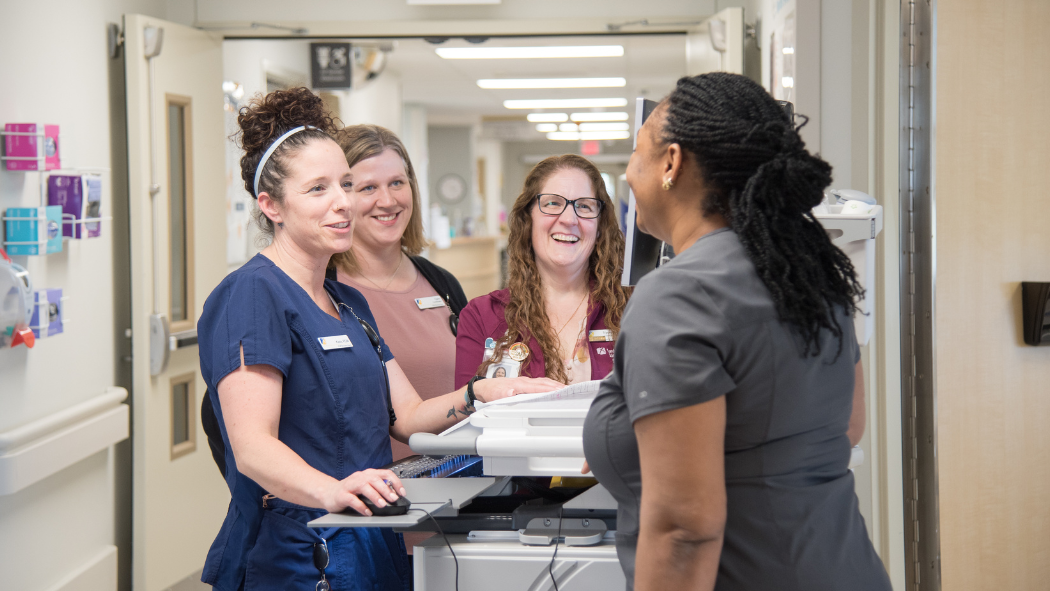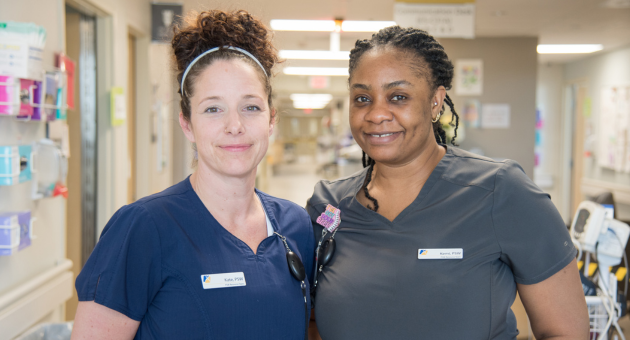
Pictured from left to right: Kate Kill, Claire Davies, Tracey Brown and Kemi Nwabuisi huddled around a workstation
May 20, 2025
In a complex and ever-changing acute care environment, resource PSWs at London Health Sciences Centre (LHSC) play a critical role in patient care during times of need.
The PSW Resource Team is a group of highly skilled personal support workers (PSWs) who are not assigned to a specific area. Rather, they are a pool of agile individuals who provide coverage to units experiencing high patient volumes or staff shortages.
“Our staff are trained to work in a multitude of different situations, with some receiving further specialization for areas like the Obstetrical Care Unit (OBCU), Post Anesthesia Care Unit (PACU), Critical Care and Trauma Centre (CCTC) and Intensive Care Unit (ICU),” says Claire Davies, coordinator of the PSW Resource Team at LHSC. “What makes them unique, however, is how incredibly resilient they are, often deploying at a moment’s notice to another unit and jumping right into whatever needs may be found there.”
When a unit somewhere within LHSC requires PSW support, the staffing department assesses the request and fills the gaps with available resource PSWs. This flexibility allows the PSW Resource Team to cover staff vacation and sick time and provide care during patient surges.
The PSW Resource Team was established in 2018 as part of a professional practice project. It aimed to provide PSWs with flexibility in their schedules and the opportunity to gain experience caring for different types of patients across the organization, while ensuring adequate staffing coverage would be available when needed. This model has largely been successful, with many PSWs remaining on the team since its inception.

LHSC currently has 170 part-time resource PSWs. At any given time, about 30 to 40 of them are on shift, providing support to various inpatient units at Victoria, University and Children’s Hospitals.
Generally, resource PSWs find out where they will be for their next shift the night prior; however, sometimes they don’t find out until an hour before. Occasionally, they will even be redeployed to another area while on shift.
"Resource PSWs often come in early and begin their day by chatting with the nurses to see what they need,” says Kemi Nwabuisi, one of the PSWs on the team. “We’ll then begin helping patients with personal care tasks such as toileting, bathing or showering, changing clothes, feeding or getting up and moving around.”
Resource PSWs also provide observational care to patients who need a little extra supervision or companionship. They are critical to ensuring each feels safe and comfortable and maintains as much dignity and independence as possible.
“One of my most touching moments so far was sitting down beside a patient and asking if there was anything I could do to help them stop crying,” recalls Nwabuisi. “I listened, and after a while, they turned to me and said that no one had ever asked them that before. In that moment, it reminded me how important it is to go the extra mile for patients during their most vulnerable moments.”
Kate Hill, another PSW on the resource team, has had similar experiences.
"Sometimes you meet a patient and there’s this unspoken understanding where they know I know what they need without them having to ask for it,” says Hill. “And that goes a long way to ensuring they feel seen and cared for – which is why we're all here at the end of the day.”
